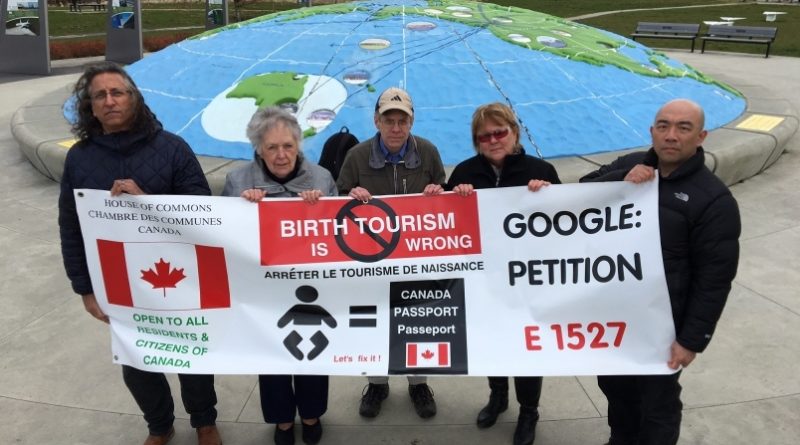Birth Tourism
Is Canada’s Birthright Citizenship Being Exploited?
Key Terms:
- Birth tourism
- Birthright citizenship, aka Jus Soli
What is Birth Tourism?
Under Canada’s Jus Soli, all persons born in Canada receive automatic citizenship, even if their parents are not Canadian citizens. This law has been in place since the first Canadian Citizenship Act in 1947. Its only exceptions are the children of diplomats.
Non-Canadians, particularly the Chinese, have taken advantage of this law. Birth tourism refers to pregnant, non-Canadian women coming to Canada to give birth so that their baby receives Canadian citizenship. In the short-term, the child will have benefits in healthcare and education, and in the long-term, they may sponsor their parents to help them immigrate to Canada. Birth tourism is legal in Canada (as well as in the U.S. and over 30 other countries), though not without a caveat; tourists cannot be denied admission solely due to pregnancy, but if they express an intention to undergo medical treatment without showing that they can pay for it, they may be rendered inadmissible.
Birth tourism is especially prevalent in British Columbia—particularly in the city of Richmond, where there are around two dozen “baby houses.” These are apartments and homes specially made for pregnant non-Canadian mothers to temporarily stay in, before and after giving birth. Some operate openly while others label themselves as tour agencies or holiday rentals.
The Extent Of Birth Tourism
In 2016, Statistics Canada recorded 313 births from birth tourism based on birth registrations. However, a newer report from the Institute for Research and Public Policy by Andrew Griffith showed that the true number may be five times greater—between 1,500 and 2,000 every year. Griffith’s data is more likely to be accurate because it was taken from the data of hospital discharges rather than birth registrations.
Protests and Criticisms
Many Canadians question the ethics of birth tourism. According to Burnaby Now, 66% of British Columbians say it can degrade the value of citizenship in Canada, and 82% believe the foreigners can unfairly gain access to Canada’s education, healthcare, and social programs. It can also be seen as unfair for taxpayers since the foreigners are contributing very little to the funding of the systems and programs they are taking advantage of.
In March 2018, an e-petition was initiated by a Richmond resident urging the government to investigate birth tourism to its full extent and to implement measures to reduce or eliminate it. The petition was supported by Liberal Richmond MP Joe Peschisolido and made its way into the House of Commons. However, there has been no recent news on the petition.
Conservatives are particularly opposed to birth tourism. In August 2018, Conservative Party members passed a policy stating that they “encourage the government to enact legislation which will fully eliminate birthright citizenship in Canada unless one of the parents of the child born in Canada is a Canadian citizen or permanent resident of Canada.” The non-binding policy has no legal power but will make the elimination of birth tourism a part of the Conservative campaign platform for 2019.
Other Viewpoints
Meanwhile, other Canadians, including NDP Leader Jagmeet Singh, oppose the ending of birthright citizenship. Alberta Conservative MP Deepak Obhrai says that “This is a fundamental question of equality out here,” and that “We cannot choose who is going to be a Canadian and who is not going to be a Canadian.”
Immigration lawyer and CEO of VisaPlace, Michael Niren, suggests that birth tourism might even benefit Canada: “Birth rates are low right now, and birth tourism babies are going to grow up and be educated in this system and productive members of society, especially if they are brought up in our culture.” He also believes that Conservatives should be focusing on bigger immigration challenges and that the problem of birth tourism is “a politicised concept” used to “energise their base.”
Potential Solutions
According to Niren, the solution lies not in ending birthright citizenship, but in modifying immigrant access to social services. Meanwhile, Griffith outlines three different solutions in his report: first, for visitors to declare their purpose of giving birth and to render the child’s citizenship fraudulent if they fail to do so; second, to implement qualifications for birthright citizenship; and third, to take financial action against birth tourists, such as by making hospitals request substantial deposits from foreigners.
In some countries, including Britain and Australia, at least one parent must be a citizen or a permanent resident for the child to be granted birthright citizenship. This is what Griffith’s second solution suggests, and what Canada can expect should it decide to follow the footsteps of these countries. However, not much may be done before the federal election coming up in October.
Bibliography
Bilefsky, Dan. “‘Birth Tourism’ Is Legal in Canada. A Lawmaker Calls It Unscrupulous.” The New York Times, 31 Dec. 2018. NYTimes.com, https://www.nytimes.com/2018/12/31/world/canada/china-birth-tourism.html.
Canseco, Mario. “B.C. Residents Want Government to Get Tough on Birth Tourism.” Burnaby Now, https://www.burnabynow.com/b-c-residents-want-government-to-get-tough-on-birth-tourism-1.23645303. Accessed 25 Mar. 2019.
Conservatives Want to End ‘Birth Tourism’ in Canada — but What Exactly Is the Contested Issue? – National | Globalnews.Ca. 27 Aug. 2018, https://globalnews.ca/news/4411137/birth-tourism-canada/.
Study Shows Birth Tourism Much More Prevalent in Canada than Reported by StatCan – National | Globalnews.Ca. 22 Nov. 2018, https://globalnews.ca/news/4689506/birth-tourism-canada-data/.
https://images.glaciermedia.ca/polopoly_fs/1.23455340.1538841324!/fileImage/httpImage/image.jpg_gen/derivatives/landscape_804/birth.jpg

